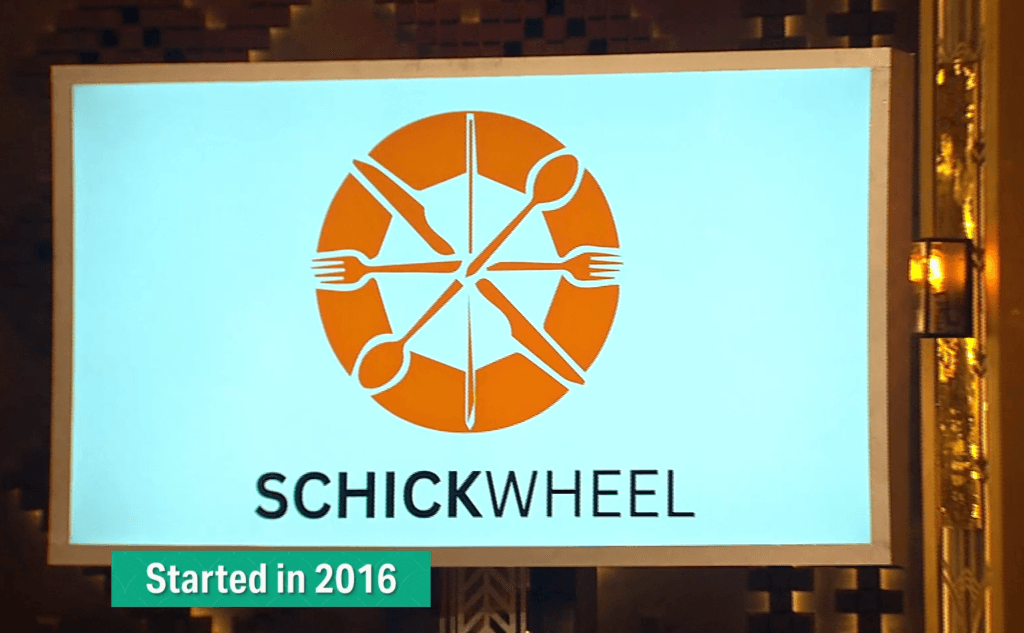Schickwheel Shark Tank India Episode Review
Website Information
- Website:- Schickwheel
- Build with JavaScript libraries – Goober, core-js2.6.5, OWL Carousel, jQuery3.6.0
- Good SEO Performance, but SEO improvement is needed.
- ORGANIC TRAFFIC: 3K visitors per month.
Founders
- Rishabh Sachdeva and Parth Sachdeva are the founders of Schickwheel. They are dedicated to quality, creativity, and customer satisfaction.
- The brothers initially wanted to start their own food business but discovered a gap in the market for reliable food truck manufacturing.

Brand Overview
- Schickwheel is a Delhi-based company revolutionizing mobile food solutions with innovative, high-quality kitchen designs for food trucks, trailers, carts, and kiosks.
- They specialize in customized, state-of-the-art mobile food vans, QSR models, and F&B hubs that cater to unique client requirements.
- Founded in 2016, Schickwheel aims to transform the mobile food industry by offering custom-designed food trucks, kiosks, and carts.
- The company designs, manufactures, and sells mobile kitchens to aspiring food entrepreneurs, helping them launch businesses without the overhead of renting a permanent space. Schickwheel has a presence in 23 states and 4 Union Territories.
Shark Tank India Appearance and Ask
- Rishabh and Parth sought ₹75 Lakhs for 1% equity, valuing the company at ₹75 Cr.
- They aimed to secure funding to expand their business.
Season and Episode Air Date
- Season: 04
- Episode: 22
- Episode Air Date: Tuesday, 04 February 2025
Product Overview
Schickwheel offers custom mobile food solutions:
- Food Trucks & Trailers: Fully equipped mobile kitchens for street food businesses.
- Kiosks: Compact setups for high-footfall areas like malls and metro stations.
- Kitchen Equipment: Industrial-grade cooking appliances for restaurants and food trucks.
- Carts: Portable food stalls for small-scale vendors.
Investor Reactions
The sharks had mixed reactions.
- Anupam Mittal felt their prices were too high and that smaller players could undercut them. He also noted that only brands or corporates would likely buy their trucks2.
- Aman Gupta recalled eating at ‘chowmein waale thele’ and offered ₹75 lakh for 5% equity.
- Kunal Bahl offered ₹2 crore for 10% equity but only enters deals if very confident2. He accused the brothers of doing ‘gajar mooli’ negotiations for being unwilling to negotiate.
- Peyush Bansal said their profitability was too low and that they needed to pivot their processes to scale.
- Vineeta Singh offered ₹75 lakh for 10% equity, which the founders rejected2.
Customer Engagement Philosophy
Schickwheel’s expertise spans from initial design to final manufacture, catering to the unique requirements of each client to provide customer satisfaction3.
Product Highlights
- Customization: Offers customized mobile food solutions tailored to client needs.
- Wide Range: Expertise spans from initial design to final manufacture of food trucks, trailers, carts, and kiosks.
Future Vision
- Schickwheel is aiming for ₹15 crore in revenue this year, which would be the first time they’ve exceeded ₹1 crore in four years of operations.
- Despite not securing a deal, their Shark Tank India appearance provided a platform to showcase their brand.
- To ensure long-term success, Schickwheel may need to reevaluate pricing to stay competitive, improve profit margins, and focus on scalability.
Deal Finalized or Not
- The founders did not secure a deal with the sharks. The sharks questioned their pricing strategy and high valuation.
- The founders were unwilling to lower their valuation significantly and rejected all offers.

| Category | Details |
|---|---|
| Website Information | |
| Website | Schickwheel |
| Built With | JavaScript libraries – Goober, core-js2.6.5, OWL Carousel, jQuery3.6.0 |
| SEO Performance | Good, but improvement needed |
| Organic Traffic | 3K visitors per month |
| Founders | |
| Name | Rishabh Sachdeva and Parth Sachdeva |
| Background | Initially planned to start a food business but identified a gap in the food truck manufacturing market |
| Brand Overview | |
| Location | Delhi, India |
| Established | 2016 |
| Industry | Mobile food solutions (Food trucks, kiosks, trailers, carts) |
| Business Model | Designing, manufacturing, and selling mobile kitchens |
| Market Presence | 23 states and 4 Union Territories in India |
| Shark Tank India Appearance & Ask | |
| Ask | ₹75 Lakhs for 1% equity |
| Valuation | ₹75 Cr |
| Objective | Business expansion |
| Season & Episode Air Date | |
| Season | 04 |
| Episode | 22 |
| Air Date | Tuesday, 04 February 2025 |
| Product Overview | |
| Food Trucks & Trailers | Fully equipped mobile kitchens for street food businesses |
| Kiosks | Compact setups for malls, metro stations, and high-footfall areas |
| Kitchen Equipment | Industrial-grade cooking appliances |
| Carts | Portable food stalls for small-scale vendors |
| Investor Reactions | |
| Anupam Mittal | Criticized high pricing; noted that only brands/corporates would buy |
| Aman Gupta | Offered ₹75 lakh for 5% equity |
| Kunal Bahl | Offered ₹2 crore for 10% equity; criticized negotiation approach |
| Peyush Bansal | Concerned about low profitability and need for scalability |
| Vineeta Singh | Offered ₹75 lakh for 10% equity, which was rejected |
| Customer Engagement Philosophy | |
| Approach | End-to-end service from design to manufacturing |
| Focus | Customization and customer satisfaction |
| Product Highlights | |
| Customization | Tailored mobile food solutions |
| Wide Range | Food trucks, kiosks, trailers, carts |
| Future Vision | |
| Revenue Target | ₹15 crore for FY24-25 |
| Key Challenges | Pricing, profitability, scalability |
| Shark Tank Impact | Gained visibility but did not secure a deal |
| Deal Finalized or Not | |
| Outcome | No deal secured |
| Reason | High valuation, pricing concerns |
| Business Potential in India | |
| Market Growth | Projected growth from $1.8B in 2023 to $2.11B in 2024 (CAGR 17.6%) |
| Entrepreneurial Opportunity | Lower investment alternative to traditional restaurants |
| Revenue Target | ₹15 crore for FY24-25 |
| Total Addressable Market (TAM) | |
| Global Market | Expected to reach $4.81B by 2029 (CAGR 17.8%) |
| Pricing | ₹2.5 lakh for carts, ₹8.5 lakh for food trucks and trailers |
| Ideal Target Audience & Demographics | |
| Clients | Aspiring food entrepreneurs, restaurant brands, corporations |
| Business Needs | Low-overhead mobile food solutions |
| Customization | High-quality, tailored mobile kitchens |
| Marketing Strategy | |
| Brand Awareness | Position as a high-quality food truck manufacturer |
| Digital Presence | Improve SEO and online visibility |
| Financial Performance | Showcase revenue growth potential |
| Content & Digital Marketing Strategy | |
| SEO Improvement | Enhance SEO to increase traffic beyond 3K/month |
| Online Content | Share success stories and product benefits |
| Performance Metrics | Optimize keywords for mobile food solutions |
| Distribution Strategy | |
| Direct Sales | Through Schickwheel’s website |
| Strategic Partnerships | Collaborate with food industry consultants |
| Advantages of Schickwheel | |
| Customization | Personalized mobile food solutions |
| Wide Range | Comprehensive manufacturing expertise |
| Revenue Growth | Consistent upward trajectory |
| Challenges Faced | |
| Profitability | High Cost of Goods Sold (COGS), thin margins |
| Market Competition | Lower-priced competitors |
| Pricing Strategy | High prices and valuation concerns |
| Mitigation Strategies | |
| Profitability | Reduce COGS to improve margins |
| Pricing | Competitive pricing to balance quality and affordability |
| Scalability | Simplify product range for efficiency |
| Future Business Roadmap | |
| FY24-25 Target | Achieve ₹15 crore in revenue |
| Key Metrics | Improve performance to attract investors |
| Product Focus | Streamline product range for profitability |
| Strategy to Increase Valuation | |
| Profitability | Improve EBITDA from 5% by lowering COGS |
| Valuation | Adjust based on market conditions |
| Scalability | Optimize product range and manufacturing |
Schickwheel Shark Tank India Business Plan

Business Potential in India
- Market Growth: The mobile food truck market is experiencing substantial growth, projected to increase from $1.8 billion in 2023 to $2.11 billion in 2024, representing a CAGR of 17.6%.
- Entrepreneurial Opportunity: Food trucks offer a lower-investment entry point into the restaurant industry compared to traditional brick-and-mortar establishments.
- Revenue Target: Schickwheel aims to hit ₹15 crore in revenue for FY24-25, indicating significant growth potential.
Total Addressable Market (TAM)
- Global Market: The global mobile food truck market is projected to reach $4.81 billion by 2029, growing at a CAGR of 17.8%.
- Custom Solutions: Schickwheel caters to businesses seeking custom mobile food solutions, with average selling prices ranging from ₹2.5 lakh for carts to ₹8.5 lakh for food trucks and trailers.
Ideal Target Audience and Demographics
- Target Clients: Aspiring food entrepreneurs, established restaurant brands, and corporations.
- Business Needs: Businesses seeking to launch or expand their food service operations with lower overhead costs.
- Customization: Clients looking for customized and state-of-the-art mobile food vans, QSR models, and F&B hubs.
Marketing Strategy for Schickwheel
- Brand Awareness: Showcase Schickwheel as a provider of high-quality custom food trucks, kiosks, and kitchen equipment.
- Digital Presence: Enhance online visibility to attract potential customers.
- Financial Performance: Highlight the potential for revenue growth and scalability.
Content and Digital Marketing Strategy
- SEO Improvement: Enhance SEO to increase organic traffic beyond the current 3K visitors per month.
- Online Content: Develop engaging content showcasing success stories and the benefits of Schickwheel’s solutions.
- Performance Metrics: Focus on keywords related to mobile food solutions.
Distribution Strategy for Schickwheel
- Direct Sales: Sell directly to customers through the Schickwheel website.
- Strategic Partnerships: Establish relationships with food industry consultants to reach a wider audience.
Advantages of Schickwheel
- Customization: Offers tailored mobile food solutions to meet unique client needs.
- Wide Range: Provides expertise from initial design to final manufacturing.
- Revenue Growth: Experienced consistent revenue growth since its launch.
Challenges Faced by Schickwheel
- Profitability: High Cost of Goods Sold (COGS) resulting in thin profit margins.
- Market Competition: Competitors offering similar products at lower prices, pose challenges to Schickwheel’s competitiveness.
- Pricing Strategy: Concerns raised by investors regarding the company’s pricing strategy and high valuation.
Reasons for Success and Mitigation Strategies
- Address Profitability: Reduce Cost of Goods Sold (COGS) to improve profit margins.
- Pricing Strategy: Develop a competitive pricing strategy that balances high-quality materials with market affordability.
- Product Scalability: Simplify the product range to make the business more scalable, as investors have advised.
Future Business Roadmap for Schickwheel
- FY24-25 Target: Achieve a revenue target of ₹15 crore by the end of FY24-25.
- Performance Metrics: Improve key metrics to attract potential investors in the future.
- Simplify: Simplify the product line to reduce COGS and maximize profitability.
Strategy to Increase Valuation
- Improve Profitability: Increase EBITDA from 5% by reducing COGS1.
- Adjust Valuation: Re-evaluate valuation based on profitability and competitive landscape.
- Enhance Scalability: Optimize product range and production processes to demonstrate scalability to potential investors.
To ensure long-term success, Schickwheel may need to reevaluate its pricing to stay competitive, improve profit margins, and focus on scalability.



Schickwheel Shark Tank India Episode Review